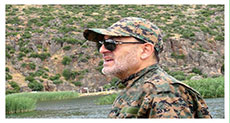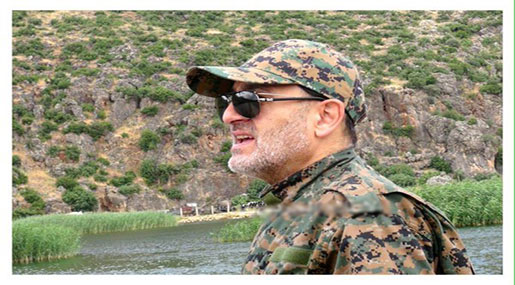
Zulfiqar… We Will Follow in Your Footsteps

By: Darko Lazar
The name, Mustafa Badreddine, has been circulating the international media for decades. But few people can claim that they really knew one of Hizbullah's highest ranking military commanders.

Thus an attempt to decipher and analyze his long list of accolades may seem futile: from the inception of the resistance movement in 1982, to his role in leading Hizbullah operations against the "Israeli" occupation of southern Lebanon between 1992-1999, to his oversight of the group's security apparatus, which uncovered several "Israeli" spy networks in Lebanon from 2000 until 2008, and finally his supervision of Hizbullah's fight in Syria from 2011.
To put it simply, the only thing that can be said about the military career of Mustafa Badreddine - whose only public image before his martyrdom was a decades-old black-and-white photograph of a smiling young man wearing a suit - is that he possessed experience, charisma, military vision and shrewdness, which are seldom found in one person.
Mustafa Badreddine was perhaps best known as Zulfiqar. The nom de guerre refers to the double-headed sword of Imam Ali (AS), Prophet Muhammad's son-in-law and the Shiite sect's most sacred martyr, symbolizing a skilled fighter during the early days of Islam.
"He has been among the founding fathers of the resistance in Lebanon. He has always exerted all of his efforts to support the Palestinian cause, to defend Lebanon and to inflict damage on the "Israeli"" enemy and to sabotage their efforts to infiltrate the Lebanese arena... He has also been engaged in the fighting against the Takfiri groups in Syria," said Beirut-based political commentator Ibrahim Moussawy.
Badreddine was the latest in a number of prominent Hizbullah figures to be martyred in Syria. But unlike in the past, the resistance group did not directly blame its traditional enemy, "Israel".
"We are not saying the "Israelis" are innocent"
On May 13, thousands of mourners marched behind the coffin carrying the body of the martyred fifty-five year old resistance leader, in Beirut's southern suburbs.
As Hizbullah fighters carried the coffin, draped with the group's yellow flag, women on balconies tossed flowers and rice. The coffin was nearly toppled at times by the jostling crowd before being taken to its final resting place near Badreddine's predecessor and brother-in-law Imad Mughniyeh, who was himself assassinated in Damascus in February 2008 in a joint Mossad/CIA operation.
The initial assumption was naturally that the same people behind the death of Hajj Radwan [Imad Mughniyeh] were also responsible for assassinating Mustafa Badreddine.
But with Tel Aviv and Riyadh broadening their areas of mutual interest in recent months, the circle of suspects quickly widened.
And following an investigation into the incident Hizbullah placed the blame on militant groups fighting in Syria.
"Investigations have shown that the explosion, which targeted one of our bases near Damascus International Airport, and which led to the martyrdom of commander Mustafa Badreddine, was the result of artillery bombardment carried out by Takfiri groups in the area," Lebanon's resistance group said in a statement.
Hizbullah named no particular group, but a wide array of extremist outfits operating in Syria and backed by Saudi Arabia would certainly have the motive and capability to carry out the attack.
Speculation quickly spread that Hizbullah blamed Syrian militants in order to avoid having to retaliate against "Israel".
But during his speech at a ceremony commemorating the one-week anniversary of Badreddine's martyrdom, Hizbullah Secretary General, His Eminence Sayyed Hassan Nasrallah, rejected the charge.
"They say Hizbullah does not want to accuse "Israel" because Hizbullah are cowards and they don't want to retaliate because they are preoccupied and incapable now," Sayyed Nasrallah said.
"We are not saying the "Israelis" are innocent. And we are not making accusation based on political calculations like other parties... When we have the indications that "Israel" was behind an attack, we will accuse them," he added.
And while the reaction in "Israel" to the incident has been largely muted, well-known "Israeli" military expert, Avi Asscharov writes that, "it is not beyond the realm of possibility that an intelligence apparatus belonging to a country other than "Israel" was behind Badreddine's assassination and is now exerting all efforts to deflect blame."
But regardless of whom the actual executioners were there is no doubt that the assassination of Mustafa Badreddine runs parallel to the interests of the "Israelis".
In a recent interview with al-Ahed News Website, Hizbullah's Deputy Secretary-General, His Eminence Sheikh Naim Qassem, pointed out that the entire region is confronted by the, "US-Saudi-‘Israeli'-Takfiri project, which serves the interest of ‘Israel'."
"The martyrdom of commander Badreddine to Takfiri hands is martyrdom to ‘Israeli' hands, which is martyrdom in confronting the hostile project. Here, details become irrelevant because the goal is what matters," Sheikh Qassem added.
According to Ibrahim Moussawy, "now it is clearer then any time before that the Takfiri groups [in Syria] are being used in a bigger plot. They are being used by the Americans and the "Israelis".
Many American officials have said that they are using them to try to destroy the resistance movements, namely Hizbullah, because Hizbullah has proven to be the spearhead of the resistance in Lebanon and the region against the "Israelis". They want the Takfiri groups to fight Hizbullah. When it comes to the Syrian government and the Syrian President, they are after him because he has been a very important fortification of the resistance in the region. That is why it is perfectly normal for Hizbullah to engage in fighting against the Takfiris."
What's Next?
Mustafa Badreddine's capabilities and broad vision are certainly going to be missed by the Hizbullah command. But this does not translate into a debilitating effect on Hizbullah fighters on the ground in Syria. On the contrary, resistance fighters execute plans and tactics that are drawn by the group's joint military command, making sure that field operations remain uninterrupted.
In recent years, Hizbullah has been transformed into an institutionalized organization. And while several exceptional commanders have fallen in Syria, the course of the war has remained the same.
In his latest speech, Sayyed Nasrallah vowed that the resistance group would remain on the same path regardless of how many important figures are killed.
"When our big commanders are martyred, there is a new responsibility, a new determination," Sayyed Nasrallah said.
In a sign that militant groups in Syria are likely to face the full wrath of Hizbullah's military capabilities, Sayyed Nasrallah added that, "more commanders will be sent to Syria, even more than there already are, and we will continue with the battle."
This is not to say that a commander like Mustafa Badreddine, with his history, understanding and influence inside the resistance group can be easily replaced. But possible successors include major figures from the same generation, such as Ibrahim Aqil, who is a member of Hizbullah's highest military body, the Jihad Council and who has been involved in the fight against terrorist groups in Syria for years.
Whoever succeeds Sayyed Zulfiqar will be looking to bid the great commander the best possible farewell, by carrying on the fight in pursuit of victory, which Mustafa Badreddine gave his life for.
Source: al-Ahed News



